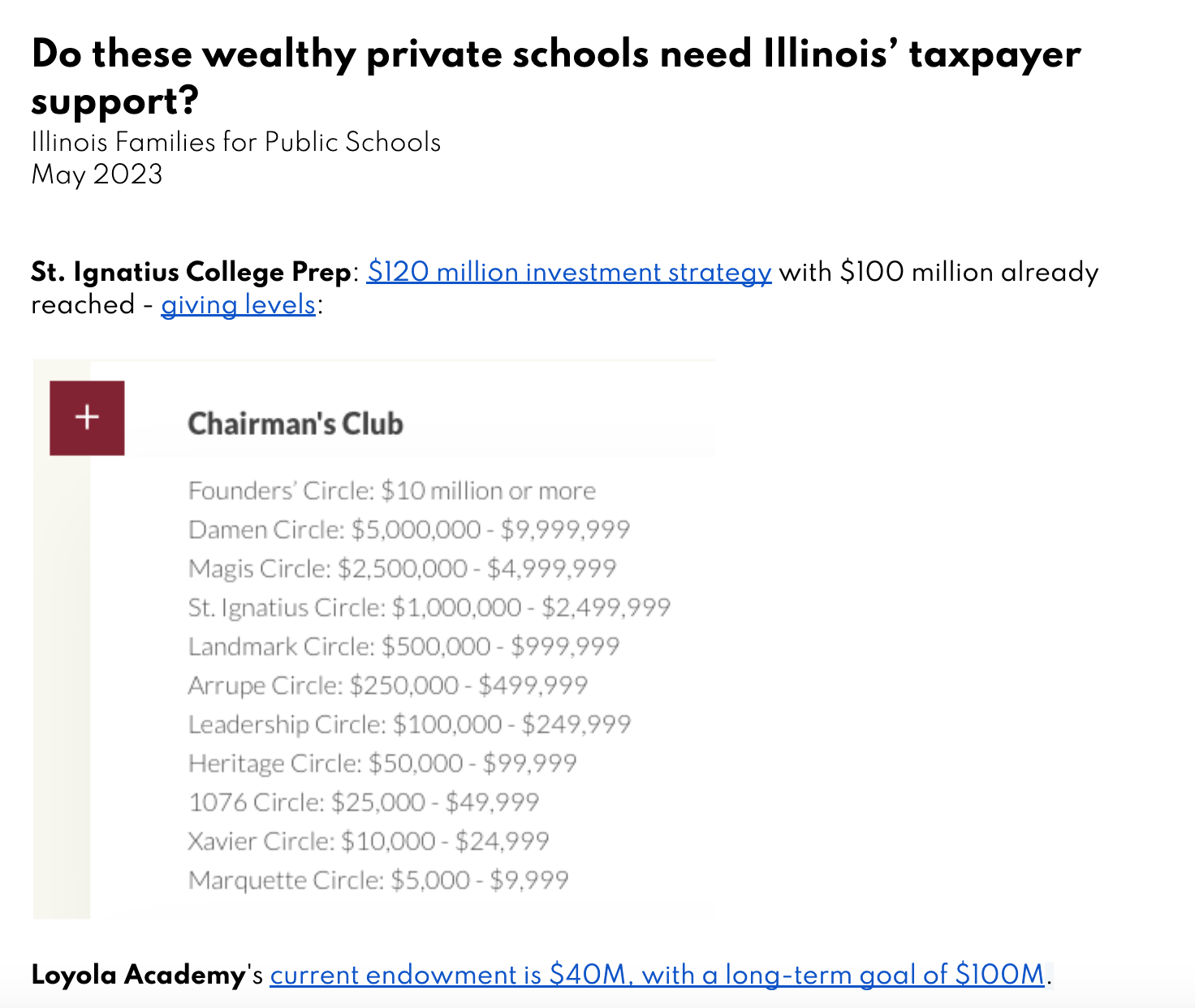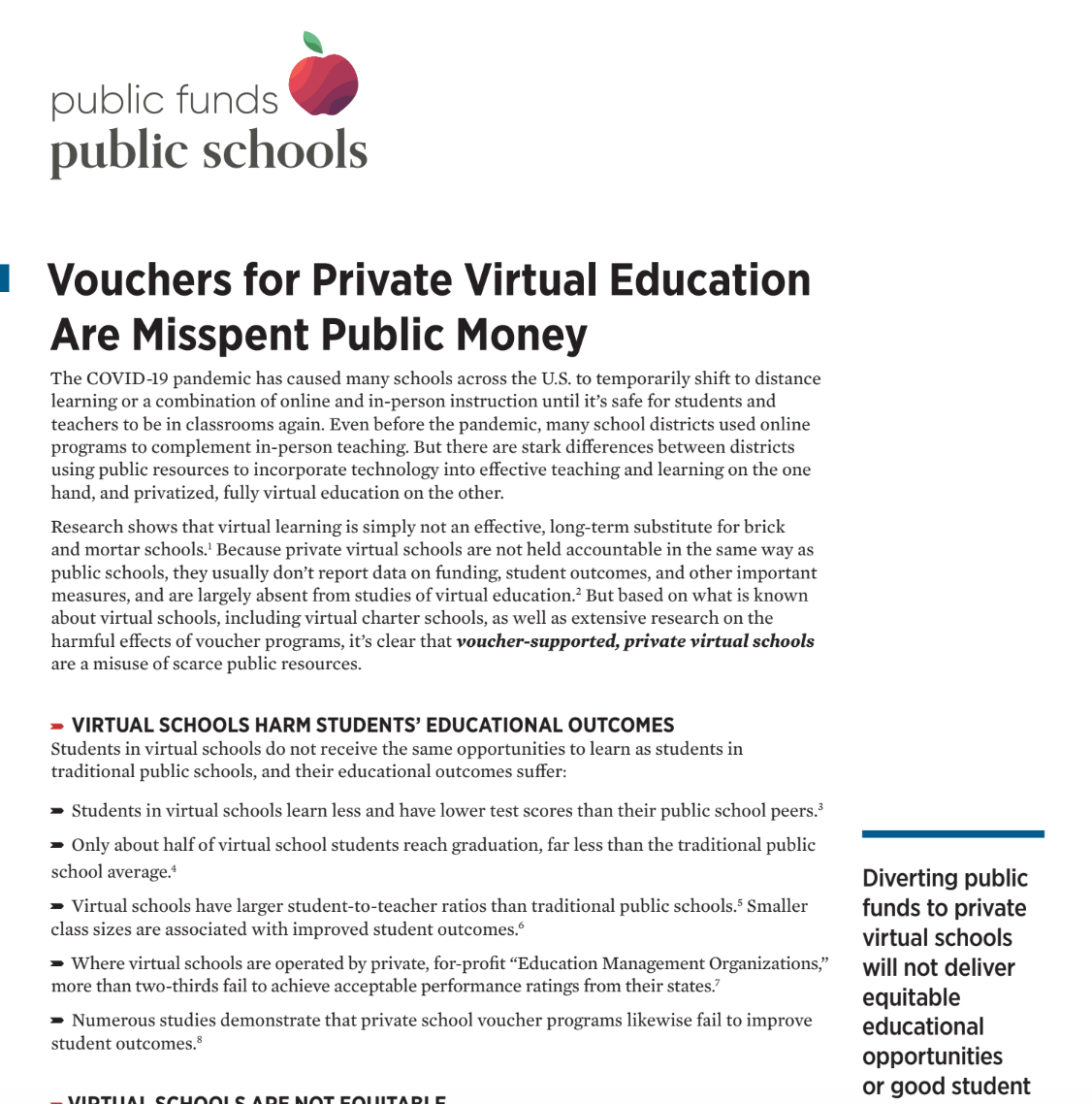ALL RESOURCES
FILTER BY TAG
Select a tag
- Academic performance
- Accessibility
- Accountability
- Advocacy
- Advocates
- Article
- Bill analysis
- Bill tracker
- Billionaires
- Blog post
- Civil rights
- Coalition building
- Community Schools
- Cost impact analysis
- Dark Money
- Data
- Disability
- Discrimination
- Drain funds from public education
- Education Savings Account (ESA)
- English language learners
- Fact sheet
- Fraud Waste and Abuse
- Graphic
- History
- Indigenous and Native Education
- Integration
- LGBTQ+
- Legislation
- Letter
- Litigation
- Messaging or talking points
- Model legislation
- National Voucher
- News
- Parents
- Personal narrative
- Podcast
- Policy brief
- Policymakers
- Radio
- Referendum
- Religion
- Report
- Rural communities
- Segregation
- Separation of church and state
- Slide deck
- Slides
- State Constitutional Right to Education
FILTER BY AUTHOR
Select an author
- Aaron Sanderford
- Alec MacGillis
- Allen Pratt
- Associated Press
- Bob Peterson
- Bruce Schreiner
- Catherine Caruso
- David Montgomery
- David Pepper
- Eli Hager
- Emily Walkenhorst
- Ethan Dewitt
- Geoff Mulvihill
- Hilary Wething
- Howard Fischer
- Jason Bailey
- Jessica Corbett
- Jim Collier
- Joe Dana
- Joshua Cowen
- Juan Perez Jr.
- Kiera Butler
- Laura Pappano
- Liam Amick
- Maurice Cunnningham
- Nora De La Cour
- Paige Masten
- Patrick Darrington
- Paul Hammel
- Phil Williams
- Rob Boston
- Robert Huber
- Rowan Moore Geretsy
- Sasha Pudelski

Here is the Truth: School Vouchers Just Don’t Work
The table, which is linked, highlights key student achievement results from six southern states. The chart shows that none of the selected school voucher programs with publicly accessible data demonstrably met their goals of increasing student achievement across grade levels, in specific subjects, or on statewide college-readiness assessments.

The Dangers of Private School Vouchers for Idaho Students, Schools, and Communities
This report by Public Funds Public Schools (PFPS) and the Idaho Center for Fiscal Policy (the Center) explains why Idaho policymakers must continue to reject proposals for private school vouchers and instead invest in the state’s underfunded public education system, which serves the vast majority of children.

Illinois’ Invest in Kids Act voucher program and the separation of church and state
Illinois’ Invest in Kids Act voucher program, diverts tax dollars to private schools via a tax credit scholarship scheme. Ninety-five percent of schools receiving voucher money are religious schools. Many of those lobbying most strongly for continuation of the program, which was intended to sunset after five years, are from the religious schools that are recipients of the voucher funds.

Do these wealthy private schools need Illinois’ taxpayer support?
Illinois Families for Public Schools developed a fact sheet with information and resources about the funding behind wealthy private schools.

Facts About Vouchers
The National Coalition for Public Education has compiled a series of fact sheets on school voucher programs.

End the ‘Invest in Kids’ Act voucher program
Illinois Families for Public Schools developed a fact sheet on why policy makers should end the Invest in Kids Act voucher program.

What To Know About the Invest In Kids Act
Illinois Families for Public Schools developed a fact sheet in English and Spanish with frequently asked questions about the Invest in Kids Act voucher program.

The True Cost of Private School Voucher Programs
In this fact sheet Public Funds Public Schools reveals the true cost of private school vouchers.

The Myths of Cost Savings from Private School Vouchers
The notion that it costs less to educate students with publicly funded private school vouchers than it does to educate them in traditional public schools ignores important realities that make voucher programs expensive, impractical and unsound.

Say No to School Vouchers
The opportunity to access a high-quality public education is foundational to the American promise of liberty and opportunity for all—a promise protected by the constitution of every state to educate young learners. School vouchers, in practice, mainly subsidize private school tuition for affluent families in or near urban areas. Private schools that accept school vouchers often restrict access to students based on ability status, religion, or personal characteristics such as style of hair. When used for school privatization, public funds primarily function as an unregulated benefit for wealthy families on the taxpayer’s dime. Instead of spending valuable time and resources on voucher programs, states should invest in strengthening the public education system with research-based strategies that improve students’ content mastery and whole-child outcomes.

The Invest in Kids Program Must End Public Dollars, No Public Oversight
This Illinois Families for Public Schools fact sheet depicts how the Illinois Invest in Kids voucher program is characterized by discriminatory revenue, low academic quality, and compulsory child labor.

What we don’t know about Illinois’ Invest in Kids voucher program
Lack of transparency and oversight for how public dollars are being spent is a fundamental flaw of school voucher programs. The Illinois Invest in Kids program is halfway through its fifth school year, and there is still a lot we don’t know about schools and students receiving vouchers. Public access to that data from state agencies is limited.

Voucher Talking Points
This talking points document from the North Carolina Justice Center includes general talking points on the impact of school voucher programs and specific points in response to 2023 voucher legislation.

What Do We Know About Voucher Schools
This National Education Association fact sheet sheds some light on Milwaukee’s school voucher programs. The research shows voucher schools are smaller than non-voucher private schools. They’re often financially distressed schools with high failure rates, and lower initial school quality indicators. A substantial portion of voucher schools are start-ups that did not exist before taxpayer support.

Vouchers for Private Virtual Education Are Misspent Public Money
Research shows that virtual learning is simply not an effective, long-term substitute for brick and mortar schools.1 Because private virtual schools are not held accountable in the same way as public schools, they usually don’t report data on funding, student outcomes, and other important measures, and are largely absent from studies of virtual education. But based on what is known about virtual schools, including virtual charter schools, as well as extensive research on the harmful effects of voucher programs, it’s clear that voucher-supported, private virtual schools are a misuse of scarce public resources.
